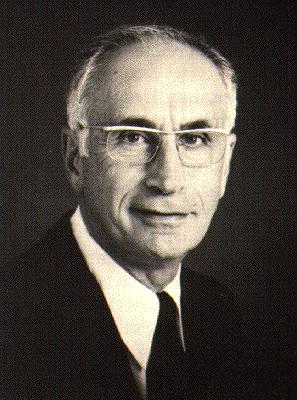
Alchian grew up in Fresno, California, the son of Armenian refugees. His training at Stanford was in both economics and statistics. His early statistical work, as a captain in the U.S. Army Air Corps during World War II, played a key role in enhancing pilot candidate selection procedures. The result: lower failure rates in pilot training programs, and superior performance where it counted—in combat.
After the war Alchian was offered appointments in both the statistics and economics departments at UCLA. Fortunately for economics, he opted to for the latter, and he spent his entire career there, save for occasional visiting positions. For many years, he also had an appointment at the RAND Corporation, where he played a key role in the formative years of that organization.
Alchian is best known to younger economists as one of the founders of the New Institutional Economics, but he began his career with important work on economic methodology—work that is regularly cited even today. He moved on to investigate the foundations of economic cost and production functions and, with Rueben Kessel, wrote a series of seminal papers on the economic effects of inflation. In the late 1950s, he began an inquiry into the economics of property rights, a research agenda that produced path-breaking papers over a span of nearly forty years. And, with Harold Demsetz and others, Alchian’s research on the theory of the firm has contributed importantly to our understanding of a wide array of economic institutions.
Alchian’s appetite for golf was legendary; on at least one occasion he showed up for class in golf shoes, having just finished “a quick nine” at his local course. One of his great friends and golfing partners was George Stigler who, Alchian claimed, asked a question on the course one day that led Alchian to write his famous paper on information costs and unemployment. Alchian continued to play well into his eighties, and even authored an opinion piece for the Wall Street Journal explaining why golf was the exemplary game of a capitalist society.
He was the consummate practitioner of the Socratic Method, and his students remember him as a terrifying and exhilarating master of the classroom. The terror stemmed from the prospect of being called upon by Alchian, for no diligence or foresight in preparing for class could withstand Alchian’s inquiries. The exhilaration arose from the simplicity, elegance, and power of the ideas that came out of every classroom session. Alchian was fascinated with the behavior he observed in the world around him, and every day he dissected another part of it in front of his students. It was a transformative experience for those privileged to enjoy (or, occasionally, suffer from) it.
Despite Alchian’s formidable classroom (and seminar) presence, he was fundamentally kind, shy, compassionate, and humble. He was a relentless debunker and intellectual inquisitor, and a passionate champion of individual liberty. Economics has lost a powerful force, and we have lost a man who exemplified the best of what humans can be.
Daniel Benjamin is a senior fellow at PERC and the editor of the two-volume series, The Collected Works of Armen A. Alchian, available from Liberty Fund.


